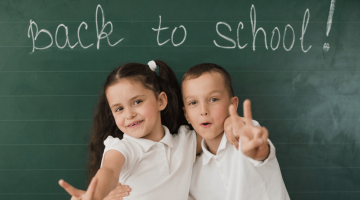Developing Social Skills for Kids
Updated on January 4, 2024
Preschoolers and kindergarteners are egocentric. Typically, they will not know how to handle themselves while playing and interacting with peers. Therefore, they will have difficulties cooperating, sharing, and empathizing with other kids in various activities. That is why you should know how to incorporate necessary social skills for kids so that they are able to handle themselves being with their friends and family.
What Are Social Skills for Kids?
Social skills are kids’ abilities to control their words and actions, which helps get along better with their peers, friends, and elders. It is important that you involve children in activities that teach how to treat others with kindness, courtesy, honesty, and respect. These skills will help them become successful in society.
The Importance of Social Skills
When it comes to a child’s development, there are milestones that signify the level of a child’s growth and advancement. The importance of social skills is immeasurable in many areas of a child’s life.
Development of social skills from an early age can impact childrens’ health, stability, and happiness throughout their entire growth. When children lack these skills, they may face difficult situations where they will be unable to make new friends and communicate effectively with unfamiliar people. Kids may also not know how to handle and understand some situations, like when to joke or use figurative language.
Social skills also help kids develop into teenagers with better behaviors, thus succeeding in education, making greater careers, reaching set goals in their lives, and developing stronger friendships.
Math & Reading Camp
Join us to help your kid achieve
their full math and reading potential!
 Apply now
Apply now
6 Basic Social Skills Kids Should Possess
Kids with good social skills have better relationships with their peers. But those with robust social skills will benefit more beyond being accepted in social circles. The following is the list of important social skills kids require:
1. Cooperating
Cooperation means coming to work together to achieve a common goal. When children learn the skill of cooperation, they are able to respect one another when making requests, contribute to the common goal, help others, and participate in the process.
Well-developed cooperation skills will make your child a successful person in the community. They will easily get along with classmates both during lessons and on the playground.
From a kid’s early age, you can encourage them to start cooperating with others in activities like building a toy tower or taking part in a game that requires many kids to be involved in winning.
Cooperation will also prepare children for starting a romantic relationship when they get older and fitting well in their working environment.
2. Sharing
Sharing is part of our daily life, but it is not an easy thing to do. You may need time to teach your toddlers, preschoolers, or kindergarteners to share with others. At an early age, most kids usually focus on their own desires and needs rather than those of their peers and other people.
It is normal for a kid to act this way rather than to please others as children believe that everything belongs to them. The ability to share is a crucial social skill that helps build friendships. Further, it will help youngsters learn to bond with others and show appreciation.
3. Being Patient
“Patience is a virtue”. You must have heard this cliché numerous times. The ability to be patient is a crucial social skill to teach your children because it’s normal for them to become impatient.
Once kids learn this virtue, they will appreciate how rewarding it is in their lives. Patience is crucial in many ways, such as in achieving big goals in life and maintaining a friendship with others.
You can teach kids to wait because sometimes good things take time to achieve. By instilling in children the concept of delayed gratification, you will help them become patient in many aspects of life.
4. Being Positive
Children developing a positive attitude are making important first steps towards developing a growth mindset. A positive attitude will also help them learn how to be optimistic and view life challenges on the brighter side.
One of the strategies you can use to assist your child in developing this significant social skill is having regular discussions on any topic that may trouble a kid and learning them to have positive self-talks. Help kids model a positive attitude even when things don’t work out.
You can also buy social skills books for kids that tell about positive attitudes, such as Because Amelia Smiled by David Ezra Stein and Ish by Peter H.Reynolds.
Your kids should also understand that sometimes being positive may not work. Tell kids that honest self-criticism is normal when they feel things are not right.
5. Respecting Personal Space of Others
Some kids are close talkers in nature, while others will crawl into other laps of acquaintances without realizing they are making people feel uncomfortable. You should teach your kids to respect everyone’s personal space.
To help kids learn this indispensable skill, you can create rules in your own home by which each family member respects another one’s personal space. Such rules may include knocking on the closed door before entering a room and keeping hands to oneself.
If you notice your kids are developing a habit of grabbing things from other people’s hands or are becoming impatient to an extent of pushing others, let them know the consequences they will face if they continue with such behaviors.
If your child talks too close to other people or climbs into the laps of acquaintances, you can use the moment to pull them aside and remind them to respect one’s personal space. Show a child how to stand while talking to others, like standing about an arm’s length from a person during a conversation. Also, tell children about a proper distance when forming a line and remind them to keep their hands to themselves always.
6. Making Eye Contact
Tell your child about the importance of effective communication. Let them understand that eye contact is part of a productive talk or discussion. Generally, some kids find it difficult to look into the eyes of others during a conversation. When you notice your child is shy or prefers to stare away when talking to you or someone else, emphasize the importance of eye contact.
Find ways to overcome a kid’s shyness but be careful not to make them even more anxious. For instance, you can teach your child to look into your eyes while you look away and ask them how they feel at this entire moment. Thus, kids will be able to overcome such fear with time.
Math & Reading Camp
Join us to help your kid achieve
their full math and reading potential!
 Apply now
Apply now
How to Teach Social Skills to Kids?
Lack of social skills may contribute to poor performance in school. You can use the following systematic approach to teach your child important social skills:
1. Discuss the need for developing social skills
Primarily, help a child understand why the skill is important in their life. Find out the problems they have encountered and develop a list of skills you can work on together.
2. Select a social skill
Your children may need to develop several skills. However, It’s best to focus on one thing at a time. For example, you can begin with explaining to kids how to praise or show appreciation.
3. Teach the skill
One of the ways to help kids learn is the use of social skills worksheets for kids that you may complete together. Another option is social skills games for kids, like roll the ball, topic games, and Emotion Charades.
4. Practice the skill
Applying various methods like games, charts, and videos is not enough. It’s important that you instruct kids to practice the skills right away. For instance, if the chosen social skill is listening, you can ask questions and share ideas about a topic you prepared. Give kids a chance to pause and reflect on whatever they’ve learned.
5. Review and reflect
At the end of an activity, let children reflect on how their social skills were used. After, discuss the positive lesson and the ways social activities will impact their lives.
Social skills videos for kids will also be helpful, such as videos about kindness or helpfulness. You can also work together with older kids on creating skills t-charts.
Conclusion
While there are many social skills you can teach your kids, please remember that first of all, you should model their behavior, offer positive reinforcement, and teach emotion regulation. You can incorporate some role play in the learning process by setting a good example, thus allowing a child to learn through observing and playing.













